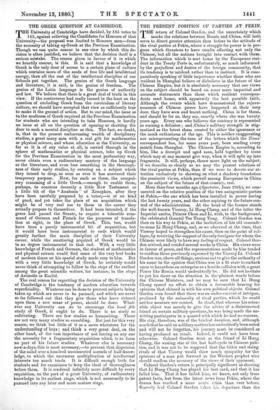THE GREEK . QUESTION AT CAMBRIDGE. T HE University of Cambridge have
decided, by 185 votes to 145, against relieving the Candidates for Honours of that University—the proposal was limited to Honours men—from the necessity of taking. up Greek at the Previous Examination. Though we can quite concur in one view by which this de- cision is often justified, we believe that the decision itself is a serious mistake. The reason given in favour of it in which we heartily concur, is this. It is said that a knowledge of Greek is the only door of access to a certain plane of culture which contains more of the seeds of free life and intellectual energy, than all the rest of the intellectual discipline of our Schools put together. The genius of the Greek language and literature, it is said, is the genius of freedom. The genius of the Latin language is the genius of authority and law. We believe that there is a great deal of truth in this view. If the controversy had really turned in the least on the question of excluding Greek from the curriculum of literary culture, we should have accepted that view as sufficiently true to make it the ground of action. But to our mind, the issue as to the modicum of Greek required at the Previous Examination for students who are intending to take Honours, is hardly an issue at all on the question of opening or shutting the door to such a mental discipline as this. The fact, no doubt, is, that in the present embarrassing wealth of disciplinary studies, a great many men with a real gift for mathematics or physical science, and whose education at the University, so far as it is of any value at all, is carried through in the sphere of mathematics or physical science, take up Greek for the Previous Examination in the most perfunctory way, never obtain even a rudimentary mastery of the language or the literature, and even •lose something in the thorough- ness of their early studies, by entering on a subject which they intend to drop, as soon as ever it has answered their temporary purpose. Now, for such as these, the compul- sory cramming of a little Greek,—enough to enable them, perhaps, to construe decently a little New Testament or a little bit of the " Anabasis " of Xenophon, after they have been carefully prepared by a tutor,—is of no kind of good, and yet takes the place of an acquisition which might be of very real use to them in the career they actually propose to themselves. It had been intended, if the grace had passed the Senate, to require a tolerable com- mand of German and French for the purposes of transla- tion at sight, in the place of Greek. This, too, would have been a purely instrumental bit of acquisition, but it would have been instrumental to ends which would greatly further the main discipline of their University career, while the smattering acquired of Greek would be in no degree instrumental to that end. With a very little knowledge of French and German, the student of mathematics and physical science would find some of the very best books of modern times on his special study made easy to him. But with a very little knowledge of Greek, he certainly would never think of attempting to follow in the steps of the earliest among the great scientific writers, for instance, in the steps of Aristotle or Euclid.
The real reason for regretting the decision of the University of Cambridge is the tendency of modern education towards superficiality. Whatever can be done to prevent subjects being taken up which are never to be pursued, and which are never so far followed out that they give those who have entered upon them a new sense of power, should be done. What- ever any University can do to encourage the bond fide study of Greek, it ought to do. There is no study so cultivating. There are few studies so humanising. There are not very many studies so ennobling. But just for this very reason, we think but little of it as a mere whetstone for the understanding of boys ; and think a very great deal, on the other hand, of the vast importance of not forcing on any one the necessity for a fragmentary acquisition which is to form no part of his future studies. Whatever else is necessary now-a-days, this is most necessary,—to prevent that dispersion of the mind over a hundred unconnected morsels of half-know- ledge, to which the enormous multiplication of intellectual interests too much tends. It is difficult enough both for students and for examiners to keep the ideal of thoroughness before them. It is rendered infinitely more difficult by every requisition, on the part of a great University, of rudimentary knowledge in its earliest stage, which is not necessarily to be pursued into any later and more mature stage.


































 Previous page
Previous page